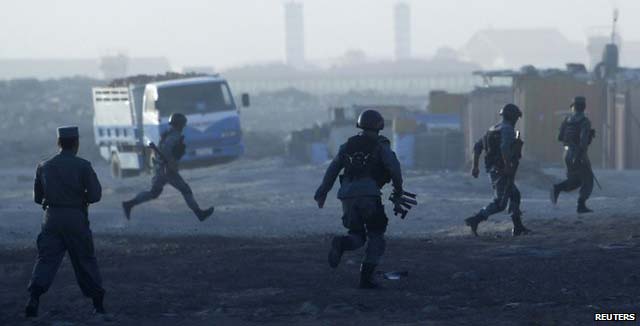The macabre stories of violence and carnage fill our bleeding nation with a great sense of anguish and disappointment. The recent police and civilian casualties in Badakhshan and Jalalabad came as a complete shock to our people. To the Afghans’ unmitigated chagrin, the untoward incidents seem to be forebodings about a bloody year. Terrorism looms large again despite being countered for the last decade by Karzai’s government and US-led NATO forces.
The revival of the Afghan Taliban as a powerful insurgent force that was apparently routed in 2001 should not come as a surprise. In fact, the radical group was never really defeated. Their fighters melted away into the population or took sanctuary across the border.
In that initial period, senior leaders were fragmented and disunited over what they should do. The shock and trauma of the fall of their regime had paralyzed the leadership. The organization had crumbled. There was no structure under which to regroup and revive. While some were determined to fight, others were more inclined to explore negotiated political options.
It took less than two years for the Taliban leadership to recover and rebuild its structure. In June 2003, a 10-member leadership shura council was formed and given responsibility to formulate a political and military strategy for the resistance. The period from 2003 to 2005 was a turning point as the Taliban consolidated their organizational structure and expanded their activities.
“One of the biggest mistakes was the failure of the West to avoid the perception that it was a party in the Afghan civil war. As a result, this phase of the war, that came to an end last December, saw the winding up of the US combat mission with no victory, illusory or otherwise.”
According to some reports, the Afghan army lost more than 17,000 troops and civilian employees as a result of desertions, combat deaths and discharges, leaving the force significantly weakened in the fight against the Taliban. Such attrition levels appear to be unsustainable.
“But it is not clear how slowing the drawdown of the US troops in Afghanistan could help stabilize the situation in Afghanistan, the goal that has remained elusive for more than one decade of conflict. It is unlikely that a limited US presence can guarantee the stability that more than 130,000 American troops at one point could not achieve. ‘It would be a mistake to change the withdrawal schedule without strong evidence that it would make a difference.’”
Currently, the deteriorated security situation is a cause for great concerns for Afghan people. A spate of odious incidents reveals the critical situation across the country. As a result, the unknown fate of 31 passengers who were abducted in Zabul province more than two months ago, the decapitation of 4 abductees in Ghazni, the death of about 30 Afghan soldiers in Badakhshan, the suicide bombings which left 33 dead and 125 wounded behind in Jalalabad and the abduction of 19 minefield workers in Paktia raised the public concerns.
The IS (Daesh) is said to claim responsibility for the suicide bombing carried out in Nangarhar province, however it is believed that a group of the Taliban ragtag militants have “changed their white flag into black one” labeling themselves as “Daesh”. This deadly attack, targeted the civilians, has revealed the sinister face of the Taliban once more. The militants terrorize indiscriminately the combatants and non-combatants alike to put the government under question and display their puissant force. If this trend continues, the government will lose its trust more than ever before.
People are in a state of utter confusion and frustration. The instability has led to a mass of unemployment and lack of investment. How a businessman can dare invest in a country where vendors and taxi drivers lose their lives on the streets, students are killed on the way to schools, passengers are abducted and soldiers are decapitated. In such a chaos, there is no assurance for the tradesmen to enjoy peace and security.
The government’s responsibility is stated in the preamble of the country’s Constitution as, “In order to: Strengthen national unity, safeguard independence, national sovereignty and territorial integrity of the country; establish an order based on the peoples’ will and democracy; form a civil society void of oppression, atrocity, discrimination as well as violence, based on rule of law, social justice, protecting integrity and human rights, and attaining peoples’ freedoms and fundamental rights; strengthen political, social, economic as well as defense institutions; attain a prosperous life and sound living environment for all inhabitants of this land; and, eventually, regain Afghanistan’s appropriate place in the international family.”
In the face of these sacred but idealistic purposes, people suffer in the worst possible way. A myriad of Afghan citizens are bereft of their fundamental rights – the rights to life, liberty, property, education, etc. Democracy is in a moribund state and social justice and rule of the law were never applied in the social life. Hope, the government’s responsibilities stated in the Constitution be put into practice so as to heal the wounded hearts of the citizens, who are victimized constantly. In short, Afghans are in urgent need of the “civil society void of oppression, atrocity, etc.” promised in the Constitution.

